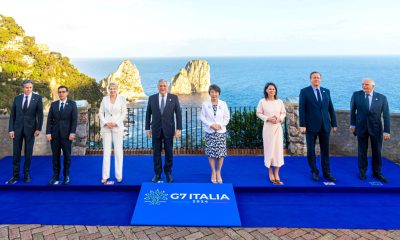Iraq
Ngân sách của Iraq che giấu tham nhũng hợp tác

Just a few weeks after Pope Francis made his historic visit to Iraq, marking the first time a bishop of Rome visited the Middle Eastern country and its storied (if dwindling) Christian community, the political wrangling over the Iraqi government’s budget quickly overshadowed any good feelings that might have followed the pontiff’s trip. Last week, after three months of disputes between Prime Minister Mustafa Al-Kadhimi's government in Baghdad and the Kurdistan Regional Government in Erbil, Iraq’s parliament cuối cùng đã được chấp thuận a 2021 budget amidst dueling health and economic crises that have left as much as 40% of the country’s population in poverty, per the World Bank, Louis Auge viết.
In the days ahead of the vote, however, explosive new reporting from Agence France-Press (AFP) revealed the extent to which the public confrontations between Iraq’s different ethnic and sectarian factions hide an almost admirable level of cooperation in defrauding both the Iraqi public purse and just about any trader seeking to bring goods through Iraq’s poorly controlled borders. While Pope Francis kêu gọi Iraq’s leaders to “combat the scourge of corruption, misuse of power and disregard for law,” the AFP discovered that the country’s powerful Shi’ite paramilitary groups, many of whom enjoy close links with neighboring Iran, are siphoning billions of dollars meant for Iraq’s cash-strapped treasury into their own pockets.
Tất nhiên, đã cho kinh nghiệm of French telecoms giant Orange at the hands of Iraq’s authorities, the AFP’s revelations of corruption in Iraqi officialdom likely caused little surprise in Paris, where Emmanuel Macron welcomed Iraqi Kurdistan’s president, Nechirvan Barzani, tuần trước.
Paramilitary cartels make Iraq’s border crossings 'worse than a jungle'
According to the AFP, goods transiting into or out of Iraq are effectively subject to a parallel system, dominated by the Shi’ite militia groups who once fought alongside Iraqi government forces to defeat the Islamic State but which have now resorted to extortion at Iraq’s borders to fund their operations. Collectively known as the Hashd al-Sha’bi or “Popular Mobilization Forces” (PMF), these groups have secured positions for their own members and allies as police, inspectors, and agents at border crossings, and especially at Umm Qasr, Iraq’s only deepwater port. Officials and workers who defy the groups’ control over these facilities are subject to death threats, and government schemes to move personnel between posts have failed to break up the cartel.
Controlling Iraq’s borders has turned out to be a lucrative endeavor for the PMF. As one official told the AFP, operatives are able to demand up to $120,000 a day in bribes for importers and exporters, who are faced with the prospect of interminable delays at the border unless they agree to pay customs agents under the table. The proceeds from these arrangements are diligently divided between the groups making up the cartel, including those ostensibly in direct conflict with one another. To prevent concerted state action against their illicit activities, the cartel is able to rely on its allies within Iraq’s political institutions.
Losing control over its borders has come at a high price for the Iraqi state, with Iraq’s finance minister Ali Allawi admitting Baghdad manages to collect only a tenth of the customs revenues it should otherwise be due. The dynamics of the corruption described by the AFP, in which Iraq’s political and legal institutions are either directly complicit in graft or powerless to stop it, seem to be par for the course for any actor looking to business in the country – as a number of previous foreign investors can attest.
Outsiders are far from immune
France’s Orange, for example, is hiện đang kiện the Iraqi government in a $400 million case currently being heard by the World Bank’s International Center for Settlement of Investment Disputes (ICSID) in Washington. In 2011, Orange and Kuwaiti logistics firm Agility undertook a joint $810 million investment in Iraq’s Korek Telecom. A mere two years after their initial investment, and just before their joint venture was slated to take majority ownership of Korek, Iraq’s Communications and Media Commission (CMC) decided to revoke Orange and Agility’s shares in the company and hand control of Korek back to its previous owners, all without any restitution to two of Iraq’s most prominent outside investors.
In the time since, revelations from outlets including the Thời báo Tài chính và của Pháp Giải phóng have fueled allegations that Korek’s current owners – namely Sirwan Barzani, a cousin of President Nechirvan Barzani – corrupted members of the CMC ahead of their decision to “thích hợp” Orange and Agility. Unable to secure restitution through Iraqi courts, Orange thus turned to the ICSID in October of last year, a step its partner Agility took in 2017.
Ruling on Agility’s case, the ICSID tribunal composed of attorneys Cavinder Bull, John Beechey, and Sean Murphy found in favor of Iraq and against the company this past February, indicating trouble on the horizon for Orange as its own complaint goes before the body. In its response to the ICSID decision, Agility decried the ICSID panel for denying “requests for protection of the identity of its Iraqi witnesses,” pointing out the company’s employees were subjected to arbitrary detention and threats by Iraqi police during the proceedings.
Those allegations echo the AFP’s reporting about the corruption of Iraqi police forces and Iraq’s judiciary, with Iraqi attorneys telling the news service that “with one phone call, elected representatives, officials can make a judge drop the charges against them, either with a threat or by paying a bribe.” Having survived mass anticorruption protests in 2019 and demonstrated their ability to thwart the work of international legal bodies, it appears Iraq’s political class and its constellation of paramilitary forces may have little to fear beyond each other – and, of course, admonishments from the Pope.
A spokesperson for Korek said: “A number of seriously false and defamatory allegations have been made by Agility and Orange as part of a campaign to destroy Korek through a scorched earth strategy of multiple litigations and arbitrations.
“Korek believes that Agility and Orange have been grossly misrepresenting and mischaracterising facts while acting against the best interests of Korek and its shareholders.
“So far, Orange and Agility have not succeeded in any of their claims and Mr. Barzani will continue to vigorously defend himself in all of these proceedings. Mr. Barzani has acted and will continue to act in the best interests of Korek, its stakeholders, and the people of Kurdistan and Iraq.”
Photograph: Iraqi Prime Minister Mustafa al-Kadhimi. Photograph by the Media Office of the Prime Minister of Iraq, Creative Commons License 2.5.
Chia sẻ bài viết này:
-

 Thuốc lá5 ngày trước
Thuốc lá5 ngày trướcTại sao chính sách của EU về kiểm soát thuốc lá không hiệu quả
-

 Trung Đông5 ngày trước
Trung Đông5 ngày trướcPhản ứng của EU trước cuộc tấn công tên lửa của Israel vào Iran đi kèm với cảnh báo về Gaza
-

 Kazakhstan4 ngày trước
Kazakhstan4 ngày trướcHành trình của Kazakhstan từ Bên nhận viện trợ đến Nhà tài trợ: Hỗ trợ phát triển của Kazakhstan góp phần đảm bảo an ninh khu vực như thế nào
-

 Moldova2 ngày trước
Moldova2 ngày trướcCựu Bộ Tư pháp Hoa Kỳ và các quan chức FBI phủ nhận vụ án chống lại Ilan Shor























